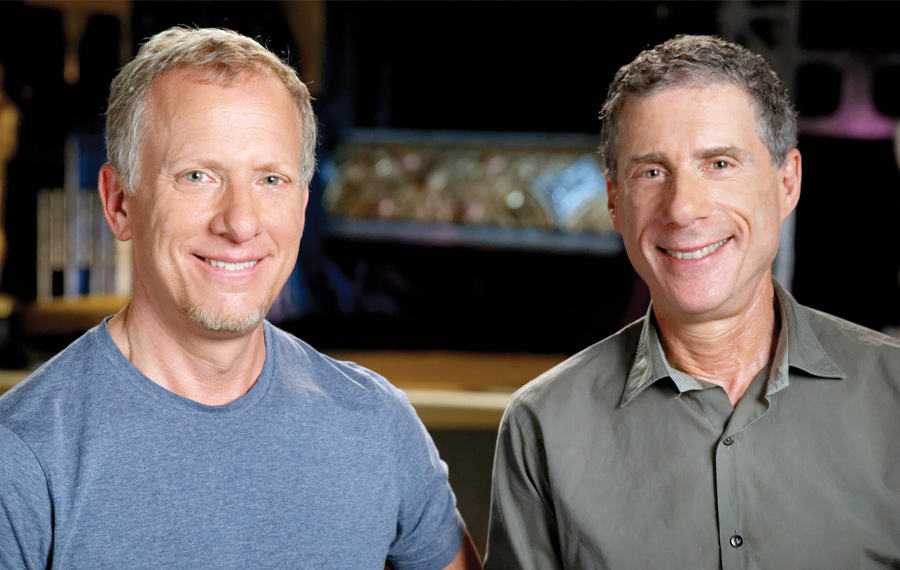 Scene from “End Game.” Photo courtesy of Netflix.
Scene from “End Game.” Photo courtesy of Netflix. Oscar-nominated for best documentary short subject, “End Game” follows patients with terminal illnesses, their families and the palliative care professionals making them comfortable. Filmmakers Rob Epstein and Jeffrey Friedman, whose films include “The Times of Harvey Milk,” “The Celluloid Closet” and “Paragraph 175,” handle a difficult subject sensitively and compassionately.
The Bay Area-based duo had personal experience with terminal illness, long before they shadowed doctors at the University of San Francisco Medical Center and Zen Hospice.
“We both lost friends and family,” Friedman told the Journal.
“We lived through the worst years of the AIDS epidemic, so we were around way too many deaths at a relatively young age, losing friends who were in their 40s,” Epstein added. “So in that sense, it wasn’t as scary a topic to take on. I also was with my father in the final moments of his life and it was really a gift. I know that death, as awful as it is, can be quite beautiful and quite special to have that time with someone you love in those final moments.”
Making “End Game,” the duo said, reinforced that notion. “One of the amazing things about these palliative care teams and the hospice volunteers is the vast storage of empathy and caring that they bring to people,” Friedman said. “Watching how that changes the experience for the people who are going through this was really uplifting.”
He and Epstein wanted to get the word out about this kind of end-of-life care, “and give thanks largely to these practitioners who are helping to frame end-of-life as a part of life. The more we can see it that way and not be afraid of it, the more we can actually have some control over how we face it,” he said.
“You hope putting light on a subject encourages conversation, and that was certainly part of our intention,” Epstein added.
The filmmakers spent about a year working with the hospital to plan and negotiate access to patients and their loved ones. “Anybody who’s in the film wanted to be in the film,” Epstein said. “It was a revelation for us while we were filming to see those tender moments between human beings, because that, in the end, is what it comes down to.”
Friedman was asleep when Epstein called him to give him the good news about the Oscar nomination. It’s Epstein’s first and Friedman’s third, having won twice, for the documentary features “The Times of Harvey Milk” and “Common Threads: Stories From the Quilt.”
“I felt thrilled and honored, especially at this point in the process. It’s recognition from our peers in the documentary branch,” Epstein said.

“It feels great to get this recognition after working together for 30 years,” Friedman said. “This time, I feel like I can fully appreciate it, at least so far. It’s not as nerve-wracking. We’ll see what happens once we get closer to the Oscars.”
“[‘End Game’] is really a very sad love story, but I feel that love triumphs. You can’t fight the inevitable, but you can face it in a way that transforms it into something
precious.”
— Jeffrey Friedman
“End Game” has worldwide exposure on Netflix, but winning the Academy Award “would mean a lot for the film, that many more people will see it. Just the nomination alone has done so much already,” Epstein said. “It’s a cliché to say that getting nominated is the honor, but it’s true.”
New York native Friedman met Epstein, originally from New Jersey, when Friedman moved to San Francisco in 1979. “I had seen ‘Word Is Out’ and wanted to meet those filmmakers because it was the first documentary made by and for gay people,” Friedman said. “One of them was Veronica Silver and she invited me to a birthday party for a friend. That turned out to be Rob.”
“We’re both East Coast Jews and there’s a lot of shorthand that goes along with that, certainly in terms of humor,” Epstein said. “We have a similar sensibility and I think that’s a part of why we’ve worked together well all these years.”
Epstein was raised “culturally Jewish” and celebrated his bar mitzvah in his backyard with 350 guests. Friedman grew up secular but surrounded by Jews on Manhattan’s Upper West Side. “I thought the whole world was Jewish,” he said. “There are values that I associate with Jewish culture that have to do with learning and commitment to repairing the world. Tikkun olam. That’s what I got from my family, but it was never presented in a religious context.”
The pair has several new projects in the works, including documentaries about singer Linda Ronstadt and the late photographer Peter Hujar. “He was very much a part of the 1970s East Village art scene, which got decimated by AIDS,” Friedman said. They’re currently editing “State of Pride,” which Epstein described as “a look at what LGBTQ pride means to young people 50 years after Stonewall, the first gay freedom march.” It will be released in June to coincide with the event’s anniversary.
“Whenever people ask me about [‘End Game’], I never know how to present it in a way that doesn’t make them afraid to watch it,” Friedman said. “It is a difficult subject, but I keep coming back to the love. The film is really a love story, a very sad love story, but I feel that love triumphs. You can’t fight the inevitable, but you can face it in a way that transforms it into something precious.”






















 More news and opinions than at a Shabbat dinner, right in your inbox.
More news and opinions than at a Shabbat dinner, right in your inbox.